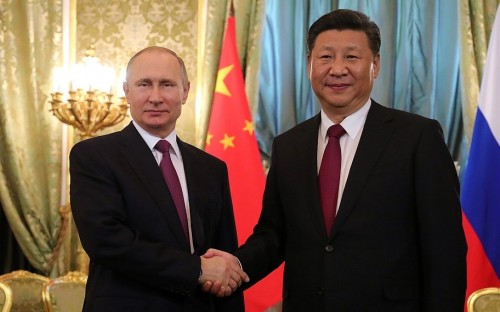Russian business schools are looking to expand internationally. For many, that means looking towards China and the East
The Cold War saw the world divided into two blocs, East and West, with the US and the Soviet Union competing for influence across global markets. In business education now, something similar—but far more productive—is afoot.While Russian b-schools have a long way to go to compete with the business school elite in the US, they are starting to expand internationally. And that, according to George Iliev, director of development markets at the Association of MBAs (AMBA), means a decisive move towards China and the East.
“Russia is now increasingly concentrated on China and the post-Soviet space,” George explains. “I see growing collaboration between schools there and schools in Moscow and Saint Petersburg. Now, pretty much every school has some sort of partnership in China—in Hong Kong, Beijing, or Shanghai—and that’s to the detriment of the US.”

Russian business schools are establishing partnerships with institutions around the world in their bid for global expansion. To do so, it makes sense to target countries with which Russia has language in common, or historic, cultural bonds.
After all, of the thousands of international students that came to study economics and management Russia in 2015, 60% were from former Soviet countries in the Commonwealth of Independent States (CIS). 24% came from Asia, compared to 3% from Western Europe.
The Graduate School of Economics and Management (GSEM) at Ural Federal University sits on the border of Asia and Europe. There, around 12% of the 4,000-plus students are international, with the biggest numbers coming from CIS countries and China.
Part of the reason Russian business schools are looking eastward is pure logistics. “It’s much easier and cheaper to run a study trip for your class of 50 MBAs to take them to Beijing or Shanghai, compared with New York,” George explains.
But going to business school in Russia is not always the same as going to business school in the West. “The economics and business faculties are very blurred,” George says. “MBA students in the East often think they’re doing a degree in economics.”
Russian business schools do have partnerships, and even deliver joint MBA programs, with schools in Western Europe, particularly in France and Germany, “but America is off limits,” says George.
“[In the US], if you say: ‘I’m a Russian school and I want to run a double degree program with you,’ even business schools outside the top-50 just wouldn’t be interested; whereas Chinese universities are.”
Russia’s Graduate School of Management at Saint Petersburg University boasts six international academic partners from China—including City University, , and from Hong Kong—alongside four from the US, and three from the UK.
Lomonosov Moscow State University Business School’s partners include Peking University’s Guanghua School of Management as well as several schools in Japan and South Korea.
Historic ties also bring new initiatives. In November 2017, Moscow School of Management Skolkovo announced it was partnering with HKUST Business School to launch a joint EMBA program, which will focus on business within the framework of China’s Belt & Road initiative—a massive infrastructure development project along the old Silk Road trade route. Skolkovo also has a blossoming partnership with China’s Shenzhen MSU-BIT University.

Sergey Myasoedov, vice rector of Russia’s RANEPA university and dean of IBS-Moscow—home to 2,000 undergraduate and post-graduate business students—says the Chinese market cannot be ignored. Around 100 IBS-Moscow undergraduate students are currently studying on exchange programs at different universities in China.
Every semester, Sergey meets with alumni and leading Russian business people to discuss the direction of the school. “We got the message that the world is going to China. If you don’t want to lose your market and your clients, you have to create a Chinese track.”
IBS-Moscow is currently in “intensive negotiations,” he says, with several business schools in China—including Shanghai Jiao Tong University’s Antai School of Economics and Management—to extend its roster of short, executive-level courses. “I hope that in the next few years we will have a joint-venture MBA program,” Sergey concludes.
While you may be still sending your MBA application letters to the US and Western Europe this year, be wary of the business school empire in the East.
Student Reviews
One of a kind
I studied Bioinformatics at CUHK last year. It was the only Master's degree in Hong Kong in this field. This program developed my analytical skills and equipped me to be a Bioinformatician in a very practical way.
I enjoyed my year here and met classmates from different parts of the world. If you are thinking to enhance your profile, this degree program would be a good option.
general education courses, unique college system, large campus
The university facilitates multi-dimension and interdisciplinary learning. In social science faculty, we need to choose courses as our faculty package from other departments (architecture, psychology, sociology, etc.) to learn more than our major required courses. We are also required to finish general education courses, which aid our critical thinking and humanistic sensibilities. I do recommend the social science broad-based program, and the professors I met so far are all responsible and erudite.
LLM
The faculty of law is relatively new. You do not need to have a LLB to pursue a LLM, which is special. The taught programme is great for mature students who want to obtain legal knowledge.
CUHK has good teaching staff too.
Amazing Campus and Great Educational Environment
Not only is CUHK's main campus breathtaking, it provides for a good educational environment for students. The university is well-equipped with modern and up-to-date facilities to help students with their study. We have 8 libraries in total around the campus; one for media, one for architectural studies, the medical library and the law library. The Professors are always helpful and are happy to talk to students when needed.
Moreover, the college system within the university brings forth the uniqueness of CUHK. Each student belongs to a different college, and in that students are able to meet different peoples from different countries and students from different faculties.
I think CUHK provides for a well-rounded university life for all students.
exthrillating
One of the most down to earth places in HK. A great opportunity to learn and embody the local culture. Also had one the most beautiful campus in Hong Kong up on the hillside. Glad to have graduated here.
Innovative and Supportive
My university provided me with all the support I needed, and encouraged me to be up to date with all the new developments in the world. They also provided me with the incentive to excel at what I do, and they take much pride in my achievements. I have had a very rewarding university experience.
Small, New But Friendly Law School
To being with, I think the campus of CUHK is the best and the biggest in Hong Kong, with fresh air and trees everywhere.
I am an undergraduate Law student at CUHK and I think the teaching here is great, with very friendly and nice professors and the new Lee Shau Kee Building.
In terms of the courses offered by CUHK, as one of the largest universities in Hong Kong, CUHK is an all-rounded university, offering a wide range of courses to students. Students may take the introductory courses of discipline other than their own major, or even declare a minor.
For law electives, due to the small amount of intake, the variety of law electives are not that huge. However, the Faculty is offering some international programmes, which can be treated as law electives, but at the same time, provide us with an opportunity to travel and know more about the legal system of another country.
The career support from the Faculty of Law is also amazing. The Faculty will organise CV Sessions and talks on how to get an internship from law firms or mini-pupillage from barrister's chambers. Each student will also have a Distinguished Professional Mentor, which is a current legal profession, providing us with practical advices and updates of the legal field.
Finally, from my personal experience, I think the students in CUHK are friendly and genuine. As Law students, competition is inevitable for grades, GPAs, vacation schemes and training contract. However, I think the competition in CUHK Law School is a positive one, in a sense that help us grow together, instead of fighting with each other no matter what. That is the biggest reason why I am having a very good time here in CUHK Law School.
A place to explore your interests
As a law graduate from CUHK (both undergrad and post-grad), I realise that I had many opportunities to explore my areas of interests (legal and non-legal both). The faculty/university requires us to take a certain number of non-law electives, and offers a plethora of courses to choose from. Personally, I took 3 modules in Korean --I can't say it's made me highly proficient, but it's definitely given me a good foundation (I can walk into a Korean restaurant and confidently order food, at the very least). The fact that language courses are offered also provides students who are more financially constrained an opportunity to learn a language without having to shell out a premium for a decent language course. On top of that, we have a range of law electives as well. I know of classmates who have developed lasting interest in different areas of law because of the electives they took in school. The two electives that I would say have changed me is (i) mooting and (ii) family law. I think my experience in an international commercial arbitration moot competition has helped tremendously in formulating legal arguments and legal writing. On the other hand, taking a family law elective has made me very interested in the family law practice, especially in terms of child rights. For these experiences which I have gained, I'm grateful for the opportunities provided by the school.
One main issue most students I know have is with the way our GPA is calculated and the lack of transparency in terms of how the honours system works. As our GPA is marked on a curve. it's highly unrepresentative of what we have achieved as individuals. Given that our GPA is the only criteria that is looked at when we apply for the compulsory post-graduate law course (mandatory should we want to practise law and/or be trainees in Hong Kong), it will put our own students at a distinct disadvantage when we compete for limited spaces with students from schools where GPA is not on a bell curve.
Valuable time in CUHK
I like the learning environment and people at CUHK. Surrounded by hills and Tolo Harbour, CUHK provides a balance between nature and hustle. You can always escape from the busy study life and meet your friend around the big campus for different activities.
The largest and great university in HK
CUHK is one of the top universities in Hong Kong and is ranked in the QS World University Rankings 2025. It consists of eight colleges, creating a diverse university experience with a wide variety of activities.
The campus is the largest in Hong Kong, featuring its own MTR station and six regular shuttle buses (1A, 1B, 2, 3, 4, 8) along with three "meet-class" school buses to provide efficient transportation between classes.










